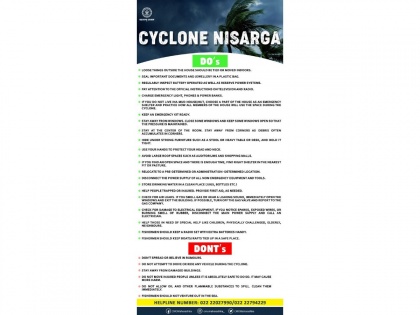Cyclone Nisarga: Maharashtra govt releases a list of "DO’s & DONT’s to stay safe"
By Lokmat English Desk | Published: June 3, 2020 11:38 AM2020-06-03T11:38:11+5:302020-06-03T11:39:00+5:30
As cyclone Nisarga intensified this morning, it is likely to make landfall on the northern coast of Maharashtra in ...

Cyclone Nisarga: Maharashtra govt releases a list of "DO’s & DONT’s to stay safe"
As cyclone Nisarga intensified this morning, it is likely to make landfall on the northern coast of Maharashtra in the afternoon between 1 pm to 4 pm, said Mrutyunjay Mohapatra, the India Meteorological Department (IMD) Director-General.
"Travelling with strong wind speed at 100-120 kmph, it is expected to make landfall during the afternoon, that means between 1 pm to 4 pm especially districts of Raigad, Thane and Mumbai," said Mohapatra.
Amid the cyclone scare the Maharashtra Chief Minister's Office has released a list of "DO’s & DONT’s to stay safe".
Here’s what you should do as precautionary measures against the cyclone:
-- Loose things outside the house should be tied or moved indoors.
--Seal important documents and jewellery in a plastic bag
-- Regularly inspect battery operated as well as reserve power systems
-- Pay attention to official instructions on television and radio
-- Practise the actions to be taken in case of emergencies
-- If you do not live in a mud house/hut, choose a part of the house as an emergency shelter and practise how all members of the house will use the space during the cyclone
-- Keep an emergency kit ready
--Stay away from windows. Close some windows and keep some open so that the pressure is maintained
--Stay at the centre of the room. Stay away from corners as debris often accumulate in corners
--Hide under strong furniture such as a stool or heavy table or desk, and hod it tight
--Use your hands to protect your head and neck
--Avoid large roof spaces such as auditoriums and shopping malls
--If you find an open space and there is enough time, find right shelter in the nearest pit or pasture
--Relocate to a pre-determined or administration-determined location
--Disconnect the power supply of all non-emergency equipment and tools
--Store drinking water in a clean place
--Help people trapped or injured. Provide first aid, as needed.
--Check for air leaks. If you smell gas or hear a leaking sound, immediately open the windows and exit the building. If possible, turn off the gas valve and report to the gas company.
--Check for damage to electrical equipment. If you notice sparks, exposed wires, or burning smells of rubber, disconnect the main power supply and call an electrician.
--Help those in need of special help like children, physically challenged, elderly, neighbours.
Here’s what you should not do:
-- Don’t spread or believe in rumours
--Don not attempt to drive or ride any vehicle during the cyclone
--Stay away from damaged buildings
--Do not move injured people unless it is absolutely safe to do so. It may cause more harm
--Do not allow oil and other flammable substances to spill. Clean them immediately.
Open in app🚨🚨
— CMO Maharashtra (@CMOMaharashtra) June 3, 2020
DO’s & DONT’s to stay safe! #CycloneNisargapic.twitter.com/bLdEXUaAdb